Trump halts Venezuela talks as US considers cartel targets on land
Published in News & Features
WASHINGTON — President Donald Trump has called off U.S. diplomatic engagement with Venezuela, people familiar with the move said, a decision that favors Secretary of State Marco Rubio’s more hard-line approach and may lead to further military escalation.
Trump told Richard Grenell, a long-time aide who had been leading diplomacy with Venezuela, that he should stop pursuing a deal with Nicolas Maduro’s administration, according to the people, who asked not to be identified because they weren’t authorized to speak publicly. Grenell had been speaking to Venezuelan officials every few days.
The decision was reported earlier by the New York Times. It marks a victory for Rubio, who had waged a turf war with Grenell and favors a more hard-line approach to the Maduro government. The White House and State Department didn’t immediately respond to requests for comment.
Trump has already ordered multiple strikes on drug trafficking vessels at sea and has recently suggested he could order the U.S. military to escalate those attacks by hitting cartel infrastructure on land — a move that may also involve risky strikes on Venezuelan military targets.
Last week, the White House declared that the U.S. was in a “non-international armed conflict” with drug cartels flooding the country with illegal drugs like fentanyl.
In the early days of the Trump administration, Grenell flew to Caracas and met with Maduro, negotiating a deal for the release of Americans held captive and the resumption of halted deportation flights from the U.S. One goal was a deal to ease crippling economic sanctions and allow Venezuela to ratchet up oil sales.
At the same time, though, Rubio had championed a tougher approach.
“The Trump administration is at a crossroads on Venezuela,” said Geoff Ramsey, a senior fellow and Venezuela researcher at the Atlantic Council. “The White House needs to decide whether to escalate, engage, or simply declare victory and move on.”
While his administration has openly called Maduro an illegitimate president and has a $50 million bounty on him for “narco-terrorism,” a U.S. military attack on a sovereign nation would still be a dramatic turn for Trump. He pledged to end U.S. involvement in foreign wars on the campaign trail and has openly sought a Nobel Peace Prize for his work pushing to halt wars in Europe and the Middle East.
On Friday, Defense Secretary Pete Hegseth said the U.S. had destroyed the fifth boat in the southern Caribbean in as many weeks, arguing that the vessel was transporting drugs bound for America.
The strikes, which have been challenged by legal scholars, follow a U.S. decision to beef up the U.S. Navy presence in the region, which has grown to least eight warships, one nuclear submarine, more than 4,000 troops, fighter jets, drones and surveillance planes. The force deployment is already the largest in the region since the 1989 invasion of Panama.
Over the weekend, Trump said U.S. strikes have already halted drug traffickers moving by sea routes, and that an expansion to land targets in the future was possible.
“They’re not coming in by sea anymore, so now we’ll have to start looking about the land, because they’ll be forced to go by land,” Trump said.
_____
©2025 Bloomberg L.P. Visit bloomberg.com. Distributed by Tribune Content Agency, LLC.







Comments